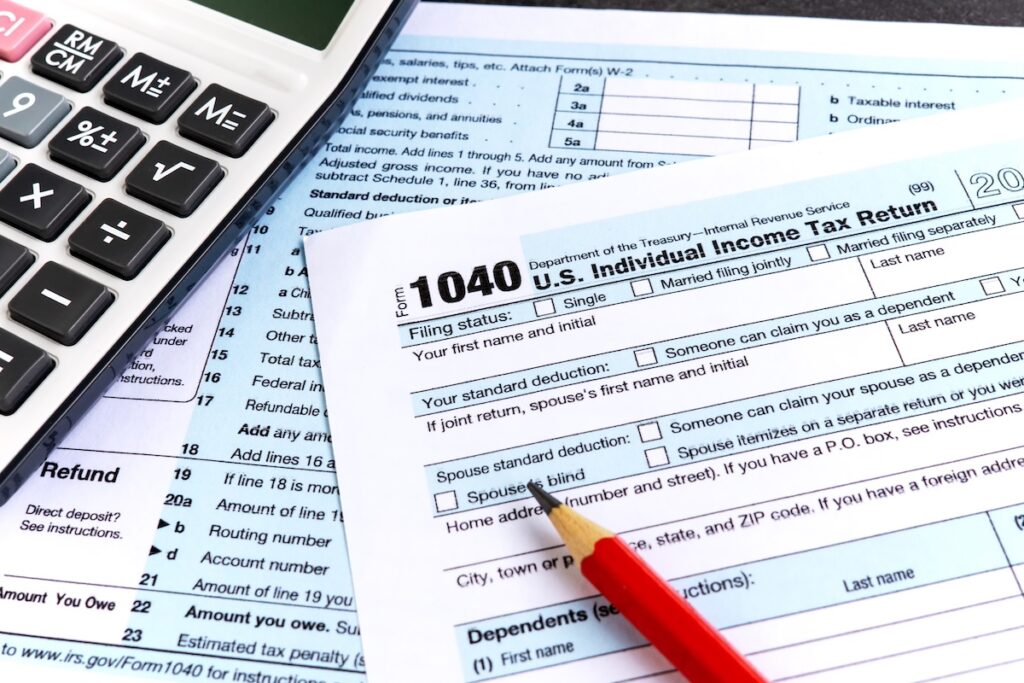
As the calendar year draws to a close, many Americans abroad are focused on the holiday season, not their taxes. And who can blame them? Between travel plans, festive soirées, and winding down with family after a busy year, tax prep can feel like something that can wait until next year.
US expats face unique challenges managing not one but two tax systems, and a little preparation now can make all the difference later. Now is the perfect time to make a few smart moves beyond just knowing deadlines that can shape your 2026 tax outcome.
In this article, we break down key year-end tax strategies to help you stay compliant, avoid surprises, and maximize every tax benefit for a stress-free filing season in 2026, without sidelining your holiday cheer!
Year-End Tax Planning at a Glance
- Learn how to maximize expat tax benefits like the Foreign Earned Income Exclusion (FEIE) and Foreign Tax Credit (FTC).
- Make smart year-end moves to lower your 2025 tax bill and avoid double taxation.
- Know which documents to organize now for a smoother, stress-free 2026 filing season.
- Understand how major life changes — a move abroad, marriage, children, or investments — can affect your US tax return.
- See how MyExpatPlanning helps you forecast next year’s return and plan with confidence.
Know When You Need to File
For the 2025 tax year (filed in 2026), once your worldwide income exceeds the following filing thresholds (for taxpayers under the age 65), you must file a US tax return:
- Single: $15,750
- Married filing jointly: $31,500
- Married filing separately: $5
- Head of household: $23,625
- Self-employed: $400 in net earnings
If you’re self-employed, you must file if your net earnings exceed $400, even if your total income is below the filing threshold.
Know How to Determine Your Filing Status in 2026
Your filing status defines how you’re categorized on your tax return and affects which tax rates, standard deductions, and credits apply to you. Choosing the correct status ensures your return is accurate and that you receive all the benefits you’re entitled to.
For the 2025 tax year (filed in 2026), most taxpayers fall into one of the following categories:
- Single: You’re unmarried or legally separated.
- Married filing jointly: You’re married and choose to file a joint return with your spouse.
- Married filing separately: You’re married but filing separately, common for Americans married to non-US citizens.
- Head of household: You’re unmarried, and you pay more than half the cost of maintaining a home while supporting a qualifying dependent. Remember, the IRS considers anyone married to a nonresident alien as unmarried for these purposes.
- Qualifying surviving spouse: You can use this status for up to two years after your spouse’s death if you have a dependent child.
Still Unsure About Your Filing Status?
MyExpatTaxes can help you determine which status is right for your situation when filing.
Determine Which Expat Tax Benefit Works Best for You
One of the most important year-end planning steps for Americans abroad is deciding which expat tax benefit gives you the biggest advantage. Both the Foreign Earned Income Exclusion (FEIE) and the Foreign Tax Credit (FTC) help prevent double taxation, but they work in different ways.
In some cases, using both together can maximize your overall benefit, though the best approach depends on your income and tax situation.
Foreign Earned Income Exclusion (FEIE): Track Your Days Abroad
If you earn income abroad, you may qualify for the Foreign Earned Income Exclusion (FEIE) on Form 2555, an expat benefit that lets you exclude up to $130,000 of foreign earned income from US taxes for the 2025 tax year (filed in 2026).
To qualify, you need foreign earned income and must meet either:
- The Physical Presence Test: You spent 330 full days in one or more foreign countries during a 12-month period.
- The Bona Fide Residence Test: You lived abroad for an entire tax year and established residence, maintaining a home, paying local taxes, or holding a residency permit.
Tracking your days abroad accurately is essential, as it’s the foundation for proving eligibility and avoiding issues when you file.
Use MyExpatPlanning to check your eligibility and forecast how the Foreign Earned Income Exclusion could impact your 2026 return.
FEIE vs FTC
See our complete guide to help determine which works best for your tax situation: Choosing Between the FEIE vs FTC for US Expats.
Foreign Tax Credit (FTC): Review Your Foreign Tax Payments
If you pay income taxes to another country, you can claim the Foreign Tax Credit (FTC) on Form 1116 to offset what you owe to the US. The Foreign Tax Credit provides a dollar-for-dollar credit for foreign income taxes paid, reducing or even eliminating double taxation.
You can apply the credit to both earned and passive income, such as wages, dividends, or rental income, as long as those taxes were paid to a foreign government. The credit cannot exceed the portion of your US tax that applies to your foreign-sourced income, but any unused credits can be carried forward 10 years or back one year.
Keep detailed records of your 2025 foreign tax payments, including the amount, date paid, and type of tax, to ensure accurate reporting when you file.
FEIE vs FTC Calculator
Not sure which expat benefit will save you more? Use our FTC vs FEIE Calculator to compare the Foreign Earned Income Exclusion and the Foreign Tax Credit side by side.
Track Your Housing Expenses for the Foreign Housing Exclusion
If you qualify for the Foreign Earned Income Exclusion (FEIE), you may also qualify for the Foreign Housing Exclusion (FHE). This benefit allows you to exclude or, if self-employed, deduct a portion of qualified foreign housing expenses.
You can exclude up to about $39,000 in 2025 for qualifying housing costs above the base limit. In some high-cost locations, the IRS allows a higher cap, so your total housing exclusion may be greater depending on where you live.
Before the year ends, review your housing costs, including rent, utilities, insurance, and reasonable maintenance costs. Collect bills and receipts for payment amounts. Organizing these records now ensures you can claim every expense you’re entitled to when filing in 2026.
Organize Your Foreign Accounts and Financial Records
If you hold bank accounts, investments, or other financial assets outside the US, you may need to report them under FBAR (Foreign Bank Account Report) and FATCA (Foreign Account Tax Compliance Act) rules. These requirements apply even if you don’t owe US tax on the income.
Start by gathering key details, account numbers, financial institutions, maximum yearly balances, and ownership information – accounts you have signing authority over count too. Keeping your account balances and records up to date will make next year’s reporting smoother and help you avoid costly penalties.
Summarize all your foreign financial assets, not just bank accounts. This includes cryptocurrency, real estate, investment and retirement accounts, foreign stocks or securities, and interests in foreign entities.
Keep Your Financial Records in One Place
Use MyExpatPlanning to securely log your account details and track foreign financial information. The tool alerts you to which reporting thresholds apply for your 2025 filing.
Review Investments and Property Sales
If you’ve sold or plan to sell investments or property in 2025, end of year is the time to review your capital gains and losses. US citizens and residents are taxed on their worldwide income, including profits from the sale of real estate or investments abroad.
If you sold your main home overseas, you may qualify for the Section 121 Exclusion, which can exclude up to $250,000 ($500,000 for joint filers) of gain, provided you meet IRS ownership and residency tests.
If you sold other assets, review whether you can use capital losses to offset gains and lower your taxable income for 2025.
Find Out if You Qualify for the Section 121 Exclusion
MyExpatPlanning has built-in calculators to check whether your home sale qualifies for the Section 121 Exclusion and estimate potential gains before filing.
Planning for Savings
It really comes down to whether you have earned income left over after claiming the Foreign Earned Income Exclusion (FEIE). If all your income is excluded, you can’t contribute to a US retirement plan. However, if you earn more than the FEIE limit ($130,000 for 2025), that leftover income can qualify for taxable compensation to allow you to make IRA contributions.
For example, if you earn $160,000 abroad and exclude $130,000 under the FEIE, you still have $30,000 of eligible income. So you can still contribute up to $7,000 to your IRA (or $8,000 if you’re 50 or older). If you’re planning to contribute to a Roth IRA, be mindful of the income thresholds that apply, as you may need to make a back door Roth IRA conversion instead.
Additional Considerations for Year-End Planning
Once you’ve reviewed your income, expat tax benefit eligibility, and foreign accounts, take a few final steps to stay ahead for the 2026 filing season.
Plan for Estimated Taxes
If you’re self-employed or earn income without US withholding, you’ll need to make quarterly estimated payments throughout the year to cover both income and self-employment tax. As the year wraps up, don’t forget your final (fourth-quarter) payment due January 15. Planning ahead now can help you avoid underpayment penalties and start 2026 on track.
Tracking Expenses for Self-Employed Expats
Add up your ordinary and necessary business expenses that directly relate to your work — such as internet and mobile service, work equipment, marketing or website costs, co-working fees, and online courses. Keeping these records organized ensures you can maximize your deductions and plan ahead accurately for estimated tax payments.
Know Your Deadlines
The IRS automatically extends the filing deadline for expats to June 15, though any taxes owed are still due by April 15. If you need more time to file, you can submit Form 4868 by the June 15 deadline to receive an additional extension until October 15.
Keep in mind that other forms, such as FBAR, follow different timelines, so it’s important to track each due date carefully.
2026 US Expat Tax Deadlines
| Filing | Deadline |
|---|---|
| Standard US Tax Return | April 15, 2026 (Expats: June 15, 2026) |
| Extended US Tax Return (if Form 4868 filed by June 15, 2026) | October 15, 2026 |
| FBAR (FinCEN Form 114) | October 15, 2026 |
Don’t Forget Charitable Donations
The end of the year is also a great time to review your charitable giving. Donations made by December 31 may qualify for a deduction if you itemize instead of taking the standard deduction. You’ll need to gather receipts and confirm that your contributions meet IRS guidelines.
Secure SSNs for New Dependents
If you’ve expanded your family in 2025, you’re eligible for the Child Tax Credit on your 2025 tax return. Apply for your child’s Social Security Number (SSN) now, since processing through a US embassy or consulate abroad can take longer.
Additionally, at least one parent needs a valid SSN to claim the refundable portion of the credit. Keep your SSN details up to date and submit all applications before year-end to avoid delays when filing your taxes.
Year-End Tax Prep Checklist
Before year-end, take time to organize the documents you’ll need for your 2025 tax return. Having everything ready early helps you avoid stress, last-minute scrambling, and missing deductions or credits.
What to prepare:
- Verify personal details: Double-check that your address, SSN, and banking info are current and match IRS records.
- Dependents: Ensure each dependent has an SSN and ITINs that are valid and up to date for claiming credits.
- Income documents: W-2s, 1099s, or foreign pay slips.
- Business or trust interests: Ensure you obtain a Schedule K-1 from any partnership, S corporation, trust, or estate in which you have an interest.
- Donation receipts and major financial records: Collect documentation for year-end deductions and credits.
Plan Smarter With MyExpatPlanning
Year-end tax planning is about more than just meeting deadlines; it’s about creating a strategy based on your situation.
Smart planning is also about preparing for what’s next. Moving abroad, family changes, retirement, and even investing all affect your US tax return. MyExpatPlanning directly shows how these changes can influence your filing status, credits, deductions, and overall strategy, so you can make informed decisions without surprises.
Ready to plan ahead? Forecast next year’s return with one of our Tax Professionals. You can submit questions or set up a 1:1 video call to review your personalized strategy and enter 2026 with confidence. Start planning today!
Frequently Asked Questions
Content of the Accordion Panel
For the 2025 tax year, the standard deadline is April 15, 2026. Expats automatically receive an extension to June 15, 2026, but any tax owed is still due by April 15. You can request an additional extension to October 15, 2026, by filing Form 4868.
Content of the Accordion Panel
The Foreign Earned Income Exclusion (FEIE) allows qualifying Americans abroad to exclude up to $130,000 of foreign earned income from US taxation for 2025. To qualify, you must meet either the Physical Presence Test (330 days abroad in 12 months) or the Bona Fide Residence Test (permanent residence abroad for an entire tax year).
Content of the Accordion Panel
The Foreign Tax Credit (FTC) provides a dollar-for-dollar credit for income taxes you paid to a foreign government. While you can’t claim the same income under both the FEIE and FTC, many expats use a combination, for example, excluding wages under FEIE and applying the FTC to passive income such as dividends or rental income.
Content of the Accordion Panel
Yes. If your combined foreign account balances exceeded $10,000 at any point in 2025, you must file an FBAR (FinCEN Form 114). You may also need to file Form 8938 (FATCA) if your foreign assets exceed higher thresholds, depending on your filing status and country of residence.
Content of the Accordion Panel
Possibly. The US taxes worldwide income, including gains from selling property overseas. However, if you sold your primary residence, you may qualify for the Section 121 Exclusion, up to $250,000 (single) or $500,000 (married filing jointly) of gain, if you meet the ownership and residency tests.
Content of the Accordion Panel
Before year-end, consider:
- Making charitable donations before December 31, paying estimated taxes to avoid underpayment penalties, tracking all foreign taxes paid for FTC eligibility, and contributing to a US retirement account if you have income above the FEIE limit.
Content of the Accordion Panel
Yes, if you have earned income not excluded by the Foreign Earned Income Exclusion. For 2025, the maximum contribution is $7,000 (or $8,000 if you’re 50 or older). For Roth IRAs, there are additional income thresholds, so you may need to determine the best strategy to contribute before.
See Why US Expats From Around the World Love Us!
Easily file regardless of how complex your US expat tax situation is.
Been here before? Sign in!


Written by Nathalie Goldstein, EA
Nathalie Goldstein, EA is a leading expert on US taxes for Americans living abroad and CEO and Co-Founder of MyExpatTaxes. She contributes to Forbes and has been featured in Forbes, CNBC and Yahoo Finance discussing US expat tax.







